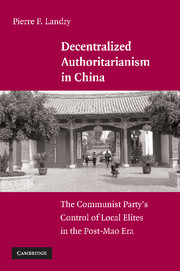 Decentralized Authoritarianism in China
Decentralized Authoritarianism in China Book contents
- Frontmatter
- Contents
- List of Tables
- List of Figures
- Acknowledgments
- List of Abbreviations
- Decentralized Authoritarianism in China
- 1 Authoritarianism and Decentralization
- 2 Organizing Decentralization
- 3 Promoting High-Level Generalists: The Management of Mayors
- 4 Organizational Power: The View from Within
- 5 Explaining Cadre Rank
- 6 The Impact of Village Elections on the Appointment of Party Branch Secretaries
- 7 Conclusion
- References
- Index
5 - Explaining Cadre Rank
Published online by Cambridge University Press: 22 July 2009
- Frontmatter
- Contents
- List of Tables
- List of Figures
- Acknowledgments
- List of Abbreviations
- Decentralized Authoritarianism in China
- 1 Authoritarianism and Decentralization
- 2 Organizing Decentralization
- 3 Promoting High-Level Generalists: The Management of Mayors
- 4 Organizational Power: The View from Within
- 5 Explaining Cadre Rank
- 6 The Impact of Village Elections on the Appointment of Party Branch Secretaries
- 7 Conclusion
- References
- Index
Summary
The success or failure of a career depends upon character and capability; it has nothing to do with the desirability of the post assigned.
Huang Liuhong ([1694] 1984: 76)The decentralization of personnel policy raises several theoretical and empirical issues for our understanding of the evolution of the Chinese political system. Pessimists have good reasons to expect failure: Local management of cadres requires myriad principals to monitor and reward an even greater number of agents posted in thousands of local government and Party organizations. Even if we assume that localities comply with central directives most of the time, the sheer number of bureaucratic layers severely reduces the likelihood that a central directive will be implemented at the lowest level. With China's five levels of administration, the odds are higher than 50% (namely, a coin toss) if all local agents comply 88% of the time! This harsh mathematical proposition conforms to the often-heard saying that “the sky is high and the Emperor is far away,” as cadres sometimes put it when discussing the gap between Beijing's expectations and the more prosaic realities of their localities.
But what if the emperor has good ears, a few carrots, and uses a stick from time to time? We already know that JES respondents believe that cadre policy has been carried out in a fashion that is broadly consistent with the central government's stated objectives.
- Type
- Chapter
- Information
- Decentralized Authoritarianism in ChinaThe Communist Party's Control of Local Elites in the Post-Mao Era, pp. 162 - 220Publisher: Cambridge University PressPrint publication year: 2008
